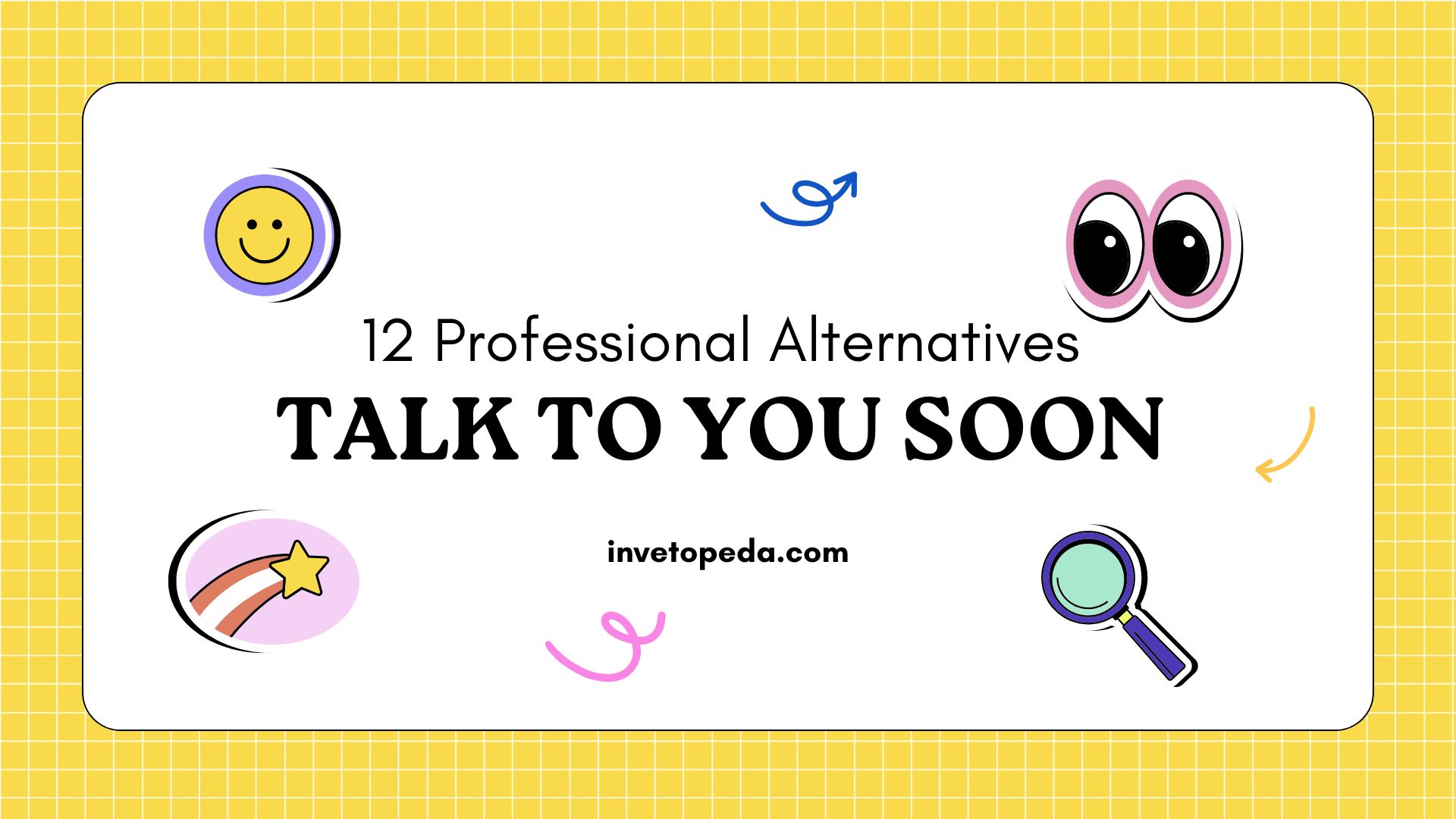If you’re closing a business email, closing the conversation via text with a colleague or closing an email on LinkedIn or LinkedIn, the expression “talk to you soon” is among the most frequently used signs of departure. It’s polite and friendly and suggests that a dialogue is likely to occur in the near future. However, like all the phrases that we use too often and repeat, it’s a bit monotonous. If you’re searching for fresh ways to express “talk to you soon” and still maintain the same feel, tone and significance, then you’re at the right place.
In this article, we’ll examine twelve easy and acceptable alternatives that are suitable in informal and professional settings. Please make use of them in emails and messages or in your calls to ensure that your conversations are lively and thoughtful.
1. Speak Soon
This is a short form of a more casual variant that is a more casual version of “Talk to you soon.” This is great to use for text messages and friendly emails that want to remain easy and casual. The phrase “Speak soon” feels open-ended, casual, relaxed, and comfortable. It’s perfect for your friends and colleagues or any person you have relationships with regularly.
2. Catch You Later
“Catch you later” is another fun, upbeat option. It’s more informal than “talk to you soon” ; nevertheless, it implies that you’ll keep in touch. This is a great option for family members or colleagues with whom you communicate often and could use verbally following the phone conversation.
3. Looking Forward to Our Next Chat
The phrase can be more powerful and performs particularly effectively when you are truly looking forward to having a conversation with them. It’s perfect for relationships with clients interview, discussions on the internet where you need to demonstrate that you appreciate your time with the person you are talking to and would like to get back in touch.
4. Let’s Stay in Touch
If you have someone that you don’t talk to very often and you are in the middle of a conversation ‘Let’s stay in touch’ is an alternative to ‘Talk to you soon.’ That can open up a way to have future communications without the commitment of a particular date or time. Use this to make connections to the businesses, to networking events and for acquaintances.
5. I’ll Reach Out Again Soon
This variant is useful for situations in which it is your responsibility to lead the next discussion. The message has the same meaning, such as “talk to you soon,” however, with an added level of clarity. It’s a fantastic way to close follow-up conversations with sales, follow-up emails and project-related emails.
6. Until Next Time
“Until next time” is welcoming, welcoming, and even a touch poetic. It is suitable for both formal and informal settings. It sends your message in an empathetic, gentle tone. The alternative for “talk to you soon” can be utilized in situations where there isn’t a specific date to follow up. However the expectation is for continued contact.
7. Chat Soon
The word “Chat Soon” keeps the conversation easy and fun. “Chat soon” is often employed in messaging applications as well as informal emails. It’s a great option when you wish to conclude on a positive note while still indicating that you’ll reconnect.
8. I’ll Be in Touch
This option gives you greater control over your person you contact next and is particularly appropriate for formal configurations. It’s an elegant method to substitute “talk to you soon” when you’re in professional messages like follow-up emails or discussion about projects, or even recruitment communication.
9. Catch Up Soon
If you’re catching up to someone after a lengthy duration, or planning a second meeting, “Catch up soon” is a thoughtful and personal note. The phrase is appropriate for both conversations and emails that are designed to keep track of issues that are personal or professional.
10. Connect Again Soon
This approach is beneficial in networking or professional circumstances. “Connect again soon” communicates that you intend to contact them but without appearing too casual. This is great for emails to clients and project updates, as well as messages from someone who you’ve recently met.
11. Looking Forward to Talking Again
If you’d like to echo the meaning of the phrase “talk to you soon” in a more precise manner, the alternative is an enthralling sound. This is useful when concluding a worthwhile or productive exchange and wish to convey your desire for continued attention.
12. Talk Later
Simple and concise, “Talk later” gives an explicit signal that communications will be resumed at a later time. It’s not as formal as “talk to you soon” and is useful in all kinds of communication, from texts of friends to texts to colleagues.
Why You Should Change Up “Talk to You Soon”
While “talk to you soon” is polite and popular, using too much of it could make your messages appear robotic or repetitive, particularly in the event that you’re completing each message or email with the same phrase. The use of a variety indicates a sense of vigilance and can add a sense of individuality to your written work.
The matter of who it’s addressed to and what tone to use, really determines what is going to be the best choice. For example, you might say “Chat soon” to a coworker in a Slack message, but in the context of an email following up with a customer, “I’ll be in touch” is more the right fit. Adjusting your language the smallest will help your communication, the message gets more clear and the tone of your voice fits.
When “Talk to You Soon” Still Works Best
We’re not saying that”talk to you soon” or “talk to you soon” is a wonderful expression! It’s friendly and warm and has a positive connotation of engagement. It’s fine to use the word occasionally, especially when you’re trying to be personable, kind and welcoming.
But, having it reserved only for occasions when you truly hope to speak with each other again shortly can make it appear more sincere. If you’re not looking forward to another discussion, or if your time isn’t certain, alternative expressions such as “Let’s stay in touch” or “Until next time” might work better.
Conclusion: Keep Your Closings Fresh Without Losing Warmth
The phrase “talk to you soon” is an old-fashioned and well-thought-out way to close the conversation, but it’s not necessary to be the only choice. You’ve already seen that there are numerous alternatives that are similar to a genuine and natural conversation as the original and can help you adapt your tone to diverse situations.
If you’re writing a casual message or writing a corporate email, you now have a selection of 12 replacements that are more than the basic. The addition of a variety to your closings ensures that your messages are professional, polished and intimate, ensuring that conversations conclude on a positive note each time. Must Read!

